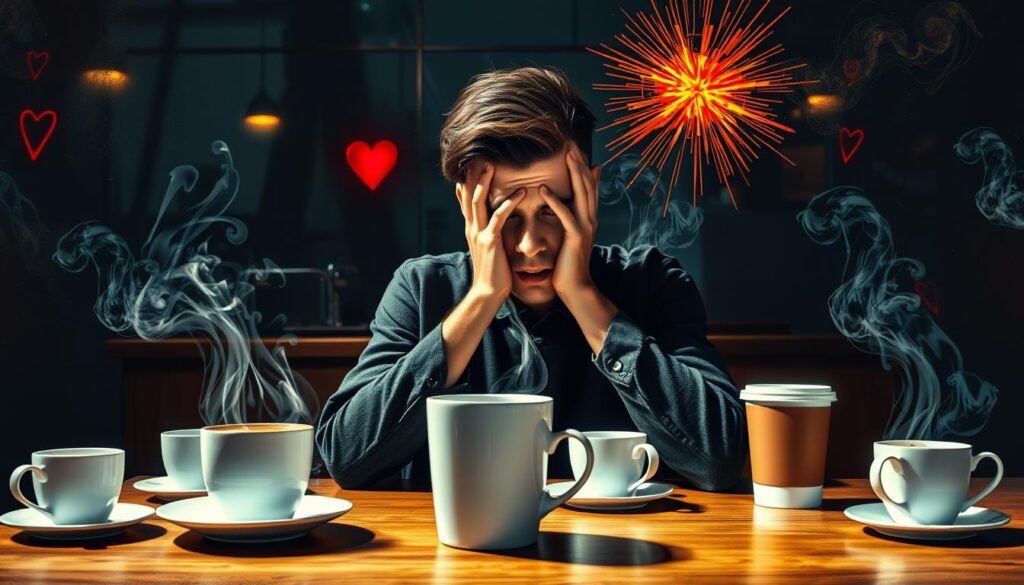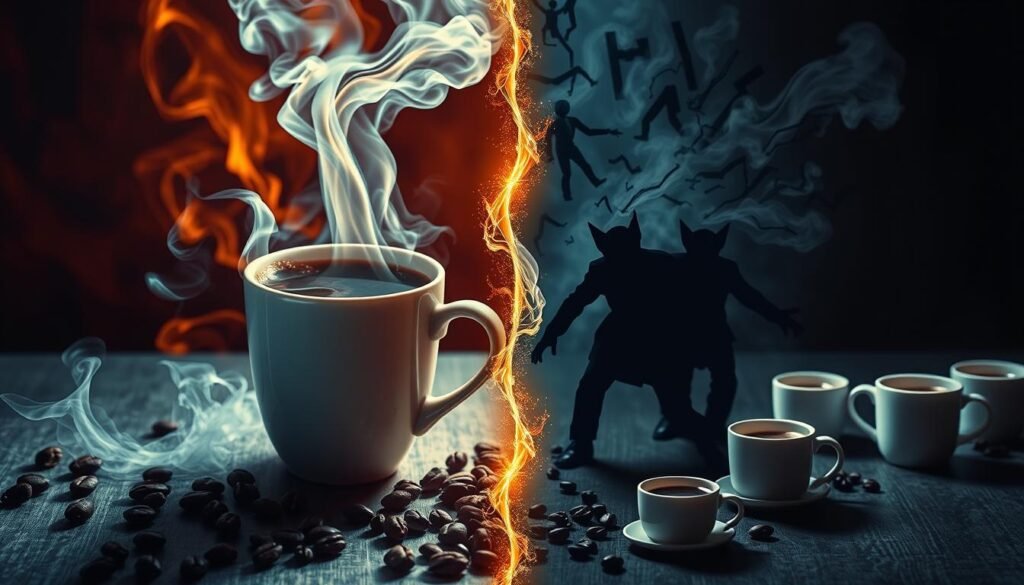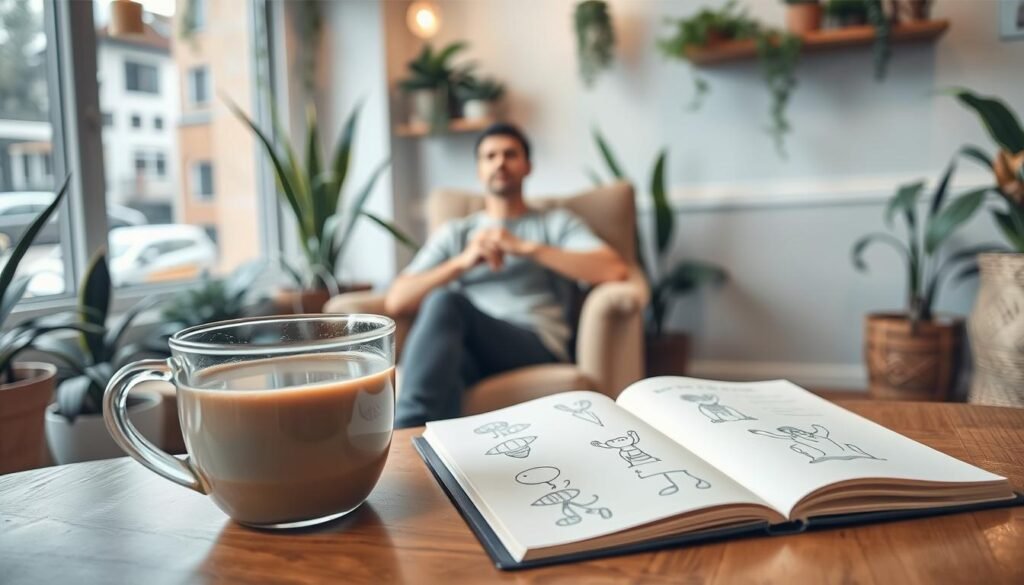Every day, over 1.6 billion cups of coffee are enjoyed worldwide. This makes caffeine the most loved drink after water. In the U.S., about 85% of people drink caffeine daily for energy and alertness. But caffeine can do more than just wake you up. Did you know 31.1% of U.S. adults will face an anxiety disorder someday? So, we wonder: does caffeine make anxiety worse?
We’re looking into how caffeine and anxiety connect. We explore caffeine anxiety and its impact on people who are more prone to it. By going over key studies and linking symptoms of anxiety from caffeine, we help you understand how to control caffeine use. Knowing this helps those with anxiety make better food and drink choices, improving their lives.
Key Takeaways
- Caffeine is the world’s most commonly consumed psychoactive substance.
- Approximately 400 mg of caffeine per day is generally considered safe for healthy adults.
- Caffeine-induced anxiety disorder is recognized in the DSM-5.
- 85% of Americans consume at least one caffeinated beverage daily.
- High caffeine intake may exacerbate anxiety symptoms in sensitive individuals.
Understanding Caffeine and Its Properties
Caffeine is a stimulant for the central nervous system. It wakes your brain up by blocking adenosine receptors. This action makes us feel more alert. Globally, it’s a hugely popular psychoactive substance. Every day, people drink over 1.6 billion cups of coffee. This shows how common it is in our daily lives.
Drinking caffeine in moderation can make you more alert and improve how you think. However, too much caffeine can cause problems. For example, it can make your heart beat faster and raise your blood pressure. These effects might feel like anxiety. So, it’s important to know how caffeine works, especially for people who already have anxiety issues.
Talking about caffeine and anxiety, the link is strong. Studies show that caffeine can increase anxiety levels. A big review of 546 people found that caffeine intake was linked to higher anxiety. The more caffeine consumed, the greater the anxiety. Small amounts raise anxiety a little, but large amounts can greatly increase it.
Even people without mental health issues can feel anxious if they drink too much caffeine – more than 400 mg a day. Given that 85% of the U.S. drinks caffeinated beverages daily, we need to understand how caffeine affects anxiety. This is crucial because so many people consume caffeine regularly.
Also, caffeine can interfere with anxiety medications. It might make them less effective or cause unexpected side effects. With the potential for caffeine to lead to anxiety and dependence, being careful with how much caffeine you drink is key. This is particularly true for individuals with a tendency towards anxiety disorders.
The Connection Between Caffeine and Anxiety
Many people are interested in how caffeine and anxiety are linked. About 85% of the U.S. population drinks caffeine daily. This fact makes us wonder how it affects our mental health, especially anxiety. Studies show that 31% of U.S. adults will face an anxiety disorder at some time.
Research from 2008 points out that too much caffeine can make anxiety worse. Also, a 2005 study found that too much caffeine can cause symptoms similar to those of sleep and anxiety disorders. The stimulant effect of caffeine often increases unease, making anxiety stronger after drinking caffeine.
The amount of caffeine in drinks can vary a lot. For example, an 8-ounce cup of plain black coffee has 102–200 mg of caffeine. A 12-ounce soda has about 37–55 mg, and energy drinks can have up to 400 mg. The FDA says adults can safely have up to 400 mg of caffeine daily. But going over 400 mg at once can cause unwanted effects.
The daily caffeine limit for kids and teens is 100 mg. It’s important to know this, especially for those prone to caffeine and panic attacks. This knowledge helps people control their caffeine use better, which might lessen anxiety from caffeine.
| Beverage | Caffeine Content (mg) |
|---|---|
| 8 oz Black Coffee | 102–200 |
| 12 oz Soda | 37–55 |
| Tall Starbucks Coffee | 250 |
| Energy Drink | Up to 400 |
| Coca-Cola | 35 |
| Mountain Dew | 55 |
It’s not just about how much caffeine you have. Understanding how it affects anxiety means knowing that everyone reacts differently. By managing how much caffeine they drink, people can help control anxiety and panic attacks. Being informed lets people make smarter choices about their caffeine use.
Does Caffeine Make Anxiety Worse: The Evidence
Understanding how caffeine affects our mental health is important. Many studies highlight that caffeine can make anxiety symptoms worse. Those with panic disorder are particularly at risk. About 51.1% of people with panic disorder felt panic attacks after consuming caffeine. This compares to only 1.7% of those without panic disorders. This shows a strong connection between caffeine intake and increased anxiety risks.
Caffeine’s Anxiogenic Effects
In studies with young rats, caffeine led to high levels of anxiety behaviors, even after stopping caffeine. Their stress hormone levels stayed high for a long time. This suggests caffeine can have long-term effects on anxiety, especially in the young. When our stress response system gets activated by caffeine, it can keep us in a state of chronic anxiety.
Panic Attacks and Caffeine Sensitivity
There’s clear evidence that caffeine can worsen anxiety for those who are sensitive to it. People often feel more anxious after drinking caffeine in clinical observations. To handle anxiety, skills like mindful breathing and relaxing muscles can help. These tools aid people in dealing with the bad effects of caffeine on their nerves. Recognizing caffeine’s role is crucial for managing anxiety better. Learn about anxiety management techniques.
| Study Type | Key Findings |
|---|---|
| Animal Study | Adolescent rats exposed to caffeine developed anxiety-like behaviors lasting beyond caffeine cessation. |
| Clinical Research | Over 51% of individuals with panic disorder experienced panic attacks after caffeine intake. |
| Hormonal Impact | Corticosterone levels remained elevated after caffeine cessation, indicating prolonged stress responses. |
| Behavioral Testing | Behavioral dysfunction observed in adolescent rats post-caffeine exposure, not seen in adult rats. |
Symptoms of Caffeine-Induced Anxiety
More Americans are drinking caffeine, and it affects our minds in many ways. Now, about 80% of us drink it often. It’s key to know how caffeine causes anxiety symptoms. Caffeine’s effects and anxiety signs often mix, making it hard for people to know what’s happening to them.
Common Anxiety Symptoms Triggered by Caffeine
Drinking too much caffeine can make you feel like you have an anxiety disorder. You might feel:
- Restless
- Nervous
- Increased heart rate
- Sweating
- Tremors
These common anxiety symptoms triggered by caffeine can confuse people. They don’t know if it’s the caffeine or an actual anxiety disorder. The American Psychiatric Association says caffeine-related anxiety is a real disorder.
Differentiating Between Anxiety and Caffeine Effects
It’s important to tell the difference between anxiety and caffeine’s effects. Caffeine-induced anxiety comes from too much caffeine. But, true anxiety disorders come from deeper mental issues. This mix-up can make getting the right help tricky.
Knowing what your body is telling you is hard but needed. If you enjoy a lot of caffeine, like in a Dunkin’ latte or coffee, watching how much you drink is key. It can help you avoid these symptoms.

| Type of Beverage | Caffeine Content (mg) |
|---|---|
| Dunkin’ Latte (14 oz) | 166 |
| Regular Coffee (8 oz) | 163 |
| Energy Drink (8 oz) | 40 – 250 |
| Bubly Sparkling Water (12 oz) | 0 |
Learning about caffeine’s effects can help us choose better. By knowing how caffeine affects us, we can manage symptoms better. We can tell the difference between anxiety and caffeine effects. For more info, check out this resource on caffeine-induced anxiety disorder.
How Much Caffeine is Too Much?
Knowing how much caffeine to have is key for managing caffeine-related anxiety. Experts say that most people can safely have under 400 mg of caffeine daily. This is about 3-4 cups of coffee. Sticking to these daily limits helps avoid bad side effects. But, how caffeine affects you can depend on your genes and how much you’re used to.
Recommended Daily Limits
Taking too much caffeine can cause problems, so it’s important to keep track. Over 1,000 mg can make many people feel nervous and shaky. Studies show that even 300 mg can stress you out more than no caffeine at all. This shows why being careful is key. For example:
| Source | Caffeine Content |
|---|---|
| Starbucks (16oz Coffee) | 310 mg |
| Energy Drink (per can) | Up to 505 mg |
| Energy Shot | 40-70 mg per fluid ounce |
| Regular Coffee (per fluid ounce) | 4-21 mg |
Individual Variability and Sensitivity
How much caffeine you can handle varies from person to person. Some can drink a lot without issues, while others might feel anxious with just a little. If you often feel anxious or have panic attacks, even a small amount might cause problems. Caffeine stays in your system for about five hours. This means you should think about how much and when you drink it. Adjusting how much caffeine you have to fit your own needs helps keep your mood stable. Making lifestyle changes, drinking enough water, and eating foods rich in serotonin can also help if caffeine makes you anxious.
The Role of Genetics in Caffeine and Anxiety
Genetics play a key role in the caffeine anxiety connection. Studies show that our genes influence how we metabolize caffeine. This affects our anxiety levels when we consume caffeine. Twin studies suggest that traits linked to caffeine use are inherited, with heritability estimates ranging from 0.36 to 0.58. This highlights genetics’ significant role. It’s also noted that the tendency to use caffeine is specific to it and not related to other substances.
Research has found that differences in the adenosine and dopamine receptors impact caffeine-induced anxiety and sleep issues. A specific enzyme variation has been tied to a higher risk of heart attacks in caffeine users. This shows genetics not only affects how we experience caffeine but also could highlight health risks for some people.
The heritability of caffeine consumption varies, pointing out the complexity of genetic factors related to anxiety and caffeine use. Studies found a genetic link of 0.48 between anxiety and caffeine use. There are also links between caffeine tolerance and various anxiety disorders. This suggests those with an anxiety predisposition may be more affected by caffeine.
Knowing about these genetic links can help personalize diet advice to manage caffeine consumption. People with family anxiety issues should be careful with caffeine, as it can make symptoms worse. With this genetic insight, healthcare professionals can better understand caffeine’s risks for anxious individuals.

Caffeine Consumption Patterns in the U.S.
Caffeine is a big part of daily life for many Americans. About 90% of people in the U.S. have caffeine regularly. This makes caffeine the most used drug worldwide. Each day, 64% enjoy at least one coffee. On average, people take in about 165 mg of caffeine a day. But, this number changes a lot among different groups.
General Trends in Caffeine Intake
Over time, more people have started drinking energy drinks and specialty coffees. These changes show that caffeine use is growing in the U.S.. This increase might raise health concerns. Studies found that too much caffeine can make anxiety and depression worse. This is especially true for certain people.
Health Implications of High Caffeine Consumption
The Food and Drug Administration says consuming over 400 milligrams of caffeine daily is not safe. Drinking more, like five or more cups of coffee, can cause problems. These include anxiety, agitation, and headaches. If you cut down on caffeine, you might face withdrawal. This can lead to headaches, tiredness, and trouble focusing.
For those with anxiety disorders, it’s key to watch how much caffeine you have. Caffeine can mess with sleep, which may increase anxiety symptoms.
Knowing about caffeine use and its impacts helps us make smarter choices. To improve mental health, finding ways to manage caffeine is smart. This could mean reducing it slowly or finding other options. Also, looking into resources about anxiety and caffeine can guide us to better habits. For more info, try an anxiety types quiz. It helps understand how caffeine affects your anxiety.
Strategies for Managing Caffeine Anxiety
To handle caffeine anxiety, think about how much you consume. Slowly drinking less caffeine can help ease symptoms. This gradual change lets your body adjust without harsh side effects like headaches and fatigue. Learning what triggers your caffeine intake and finding other drinks can also help balance your life.
Gradual Reduction of Caffeine Intake
Cutting back on caffeine slowly is better than stopping suddenly. It helps your body get used to less caffeine without bad withdrawal symptoms. You can start by cutting 50 milligrams of caffeine a day. This gentle reduction keeps your energy steady while lowering anxiety from too much caffeine.
Alternatives to Regular Caffeinated Beverages
Trying other drinks can help manage caffeine anxiety. Decaf coffee or herbal teas like chamomile and peppermint are good choices. They taste great without making you anxious. Here’s how some drinks compare to their calming alternatives:
| Beverage Type | Caffeine Content (Approx.) | Benefits |
|---|---|---|
| Regular Coffee | 95 mg per 8 oz | Boosts alertness but may induce anxiety |
| Decaffeinated Coffee | 2-5 mg per 8 oz | Reduces anxiety risk while offering similar taste |
| Black Tea | 47 mg per 8 oz | Moderate caffeine helps sharpen focus |
| Herbal Tea (e.g., Chamomile) | 0 mg | Promotes calmness without caffeine effects |

Drinking enough water and staying active can help with anxiety. Water helps remove caffeine from your body, easing symptoms. Light exercise, like walking or yoga, also helps break down caffeine. This can support long-term control over anxiety. Trying these suggestions can improve your caffeine habits and overall wellbeing.
Implications for Individuals with Anxiety Disorders
People with anxiety disorders often struggle with their symptoms. Caffeine can strongly impact them, especially if they have panic disorder. It’s crucial to understand how caffeine affects anxiety to improve well-being.
Advice for Patients with Panic Disorder
If you have panic disorder, it’s wise to cut back or skip caffeine. Drinking three or more cups of coffee may cause fast heartbeats and palpitations. This can lead to panic attacks. Knowing how caffeine affects you and watching for anxiety changes after having caffeine is key.
Professional Recommendations for Caffeine Consumption
Doctors and experts say it’s important to customize how much caffeine those with anxiety should have. Writing down your caffeine intake and how you feel afterwards can help spot links between them. Cutting back on caffeine slowly might reduce anxiety and improve sleep. Eating well and exercising regularly also aid in managing anxiety.
| Guidelines for Managing Caffeine | Recommendations |
|---|---|
| Track Caffeine Intake | Use a diary to note caffeine consumption and associated anxiety symptoms. |
| Gradual Reduction | Slowly decrease caffeine to observe changes in anxiety and sleep. |
| Monitor Symptoms | Pay attention to any recurrent anxiety or panic attacks after caffeine consumption. |
| Seek Professional Help | Consult anxiety treatment centers if symptoms persist despite personal management strategies. |
Conclusion
The connection between caffeine and anxiety is complex. High caffeine use can make anxiety worse for many. Studies show those with anxiety disorders might feel more nervous and restless after caffeine. With most adults using caffeine daily, it’s vital to know its effects on anxiety.
Drinking moderate amounts, like two cups of coffee, can cause jitters and insomnia. If you’re sensitive to caffeine, try cutting back slowly. This helps avoid withdrawal symptoms like headaches. Drinking herbal teas or water can also help reduce anxiety symptoms from caffeine.
It’s important to know how much caffeine you can handle. Using relaxation techniques and being mindful about caffeine intake can help improve mental health. This approach helps manage anxiety better and boosts overall mental well-being.